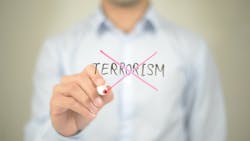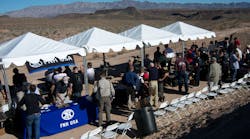If you read the world news headlines, it's easy to find articles about terrorist acts being committed in other countries and how the specific country's military responded. This is a common theme all around the world. Terrorist group commits act - country's selected military unit responds. Why is that? Because terrorists commit acts of violence that are, for all intents and purposes, acts of war. The only reason we, in general, don't label them as such, is because they aren't acting on behalf of a government. While it's no secret that many governments sponsor and support various terrorist organizations, those terrorist organizations are not given the authority to act on behalf of a specific government. So, it's not "an act of war."
Here in the United States, we have a special problem that calls for a special solution: we define terrorism as a crime. That means that our law enforcement professionals, and not the military, will be tasked to respond to and deal with terrorist acts. What's the problem then? Our law enforcement professionals are not - as part of their academy or in-service training - prepared to act as combatants on a battlefield. They are trained as peacekeepers; law enforcers; not soldiers in a war.
Here's the irony: According to LtCol R. Gangle (USMC ret) in 2002, approximately 85% of our military deployments in the past four decades had been peace keeping missions. So, to me, this naturally begs the question: If our soldiers and our law enforcement professionals are both fulfilling the primary mission of peace keeping, then why is their training so radically different?
The answer, at least partially, lies in the recognition of this fact: men (and women) can be trained to commit acts of violence and acts of defense. It is a fact that acts of defense can be violent in and of themselves. However, the primary difference between war and peace keeping is that war mandates offensive violent actions. It requires attack. Peace keeping requires constant vigilance while keeping all violent energy contained until such time as it is required to defend against an attack. Further, in peace keeping, the mandate is always to release as little of that violent energy as is necessary to repel or overcome the attack. "Using that minimum force which is necessary to affect the arrest" is a term often heard in law enforcement training.
Now, just as a barbarian cannot act civilized, but a civilized man can act like a barbarian, it's unreasonable to expect that we can train peacekeepers to train and operate within specific parameters and then expect them to shrug off all the limits they've learned when faced with acts of war. Our professional peacekeepers in the United States - those police officers, deputies, federal agents, etc. - they have spent months and sometimes years training to perform their duties within the controls and restrictions of Constitutional Law, State, County and Local laws, and departmental guidelines. They are regularly given reminders that all uses of force will be at least minimally investigated and that they (the LE professionals) will be held criminally and civilly liable if they use more force than is required.
On the other side of that coin are the soldiers in our armed forces, trained for battle; to survive and emerge victorious from the field of modern combat. Certainly, the rules of war (isn't that an oxymoron?) are taught, but the greater focus is, and must be, on decimating the enemy; overcoming those violent acts of war committed by the designated enemy with even greater amounts of violent energy. That violent energy might take the form of dropped bombs, or it might consist of an armored division. Perhaps, because of the size of the attacking force, the required violent response can be sufficiently provided by a squad of Marines. What is important to realize is that these soldiers have been trained to operate under different guidelines than those of our civilian law enforcement personnel. Where civilian LE professionals must always use the minimum force necessary, overkill is not necessarily a bad thing for our soldiers. "A fair fight means all my Marines come home," is a quote attributed to a Marine Corps Commandant.
Now, let's think about this: In my mind, war is not fair. War has few rules and most of them are disregarded when it comes down to me or him. If I'm a soldier on the ground in Baghdad and I get attacked, I'm not going to think about any use of force continuum to decide what is the appropriate level of force I should respond with. My Rules of Engagement tell me what I can and can't do. But I don't have OC Spray, a baton, TASER, handcuffs, etc. I have an M16 or an M4 and a knife / bayonet. I might have flexi-cuffs, but I'm not on patrol to make arrests. I'm on patrol to keep the peace. Sometimes (most often?) that means squashing out anyone who is interrupting the peace.
Law enforcement professionals, on the other hand, when attacked, must stay alive but are always bound by that "minimum force necessary to affect the arrest." The only exception to that I've experienced is Active Shooter training when minimum force is replaced by the mandate of "neutralize the threat." When it comes to protecting our children, we still know how to do the job right. Political correctness gets set aside and simply getting the job done takes precedence without restriction. That same outlook now needs to be taught and heavily emphasized in all potential counter-terrorism response and operations.
I know; I know. I'm probably overreacting. There probably aren't any terrorists here in the United States and if there are, they are running scared. Right? I'd believe that except for that skyscraper that’s where the twin towers of the World Trade Center used to be. I'd believe that except for the rebuilt portions of the Pentagon. I'd believe that except for the memorial in a field in Pennsylvania. And while I sometimes get criticized for being paranoid about protecting our (all American) children, it is the one topic that seems easiest for all to agree on, no matter their political outlook or views on violence. Terrorists have more than proven themselves willing to target children, and may in fact prefer to target children in the United States because:
1) Children are the least likely and least capable to resist, and
2) Children are an emotionally charged target insuring greater impact and fantastic press / media coverage.
So, what's my point? Well, as I said in the beginning, "Here in the United States, we have a special problem that calls for a special solution: we define terrorism as a crime. That means that our law enforcement professionals, and not the military, will be tasked to respond to and deal with terrorist acts." The problem we face is that our law enforcement professionals have been facing a steady decline in their training with regard to anything combat or conflict oriented.
I went to the police academy in the mid-1980s, and it wasn't uncommon for the instructors to put their hands on me. One - and this was a guy I genuinely admired - used me as a punching bag to demonstrate elbow blitzes. During in-service training in the early '90s, I was used as the guinea pig for demonstrating brachial stuns / thumps (cracked my neck well though). Some two+ decades later and our police academy curriculums have been expanded to include more law classes; increased report writing training times; courses on racial sensitivity, and more. You can rest assured that every police cadet today is receiving plenty of training on conflict resolution, anger management, de-escalation and liability management.
The problem with that is that we're so busy teaching our law enforcement professionals to evaluate and re-evaluate when they use any level of force, that when circumstances require them to respond to an act of war with maximum violence, they're going to be stuck re-evaluating circumstances while they should be pulling the trigger.
Now, real quick, let me use someone else's definition of "war" to justify my position. Let me use someone who might carry some level of respect in the world of combat and warfare... Carl Von Clausewitz:
"War therefore is an act of violence intended to compel our opponent to fulfil our will."
I may be wrong about plenty of things, but using that definition, it seems clear to me that terrorist attacks of any kind are acts of war. Since, in this country, we have labeled terrorism a crime, our law enforcement professionals will have to respond to these acts of war. Are we training them to function properly - to survive and emerge victorious - under conditions of war? The answer is very obviously no.
To properly prepare our law enforcement professionals we first have to change how we select and hire them. I personally don't care what gender, race, culture, etc that you are if you want to be a cop. What I DO care about is that you:
>Are committed to the United States, our Constitution, and our laws.
>Are not against the use of lawful violence (for any reason) to protect and defend, protect and serve, or subdue and arrest as necessary to enforce the laws.
>Have the courage to overcome your fear, or function despite it, to move toward the acts of violence as required to fulfill your duty to protect others.
>Have the courage to, without hesitation or pause, commit acts of violence against those who would commit acts of violent aggression against any American.
>Are fit enough, and dedicated to maintaining an adequate fitness level, to function in, survive and emerge victorious from a combat action.
>Are smart enough to know the difference between domestic crime and terrorist attacks.
>Are quick-witted enough to beat your opponent’s OODA cycle so that you stand a better chance of winning the conflict.
Once we've selected appropriate candidates, they need to be subjected to rigorous training to test their emotional strength and stability. While working the street they will be called nasty names; they will be attacked; they will be demeaned in many ways. If they can't tolerate such things in the relatively non-threatening atmosphere of a criminal justice academy, how can we realistically expect them to survive and function through it on the street?
The academy training should always include courses that are the norm such as Constitutional Law, Report Writing, Arrest Procedures, Fingerprinting, etc. But they should also include courses on basic anatomy in addition to basic first aid. Recruits who may one day face a homicidal maniac - or a homicidal maniac terrorist - in hand-to-hand combat should know how to cripple him; should know how to maim him; should know how to remove his ability to see, stand or breath. Such a statement makes law enforcement administrators cringe from the impending liability civil suits. I say this:
If any police academy or criminal justice institute... if any police or sheriff's agency has developed training and policy that knowingly and willingly risks a law enforcement professional's life or health merely for the purpose of reducing liability risk some infinitesimal amount, you should be ashamed of yourself. The men and women who wear the badge today deserve every bit of training and support we can give them. If we're not adequately and properly preparing them for combat against terrorists who have invaded our land, then we're doing them - and all the communities they serve - an injustice.
It's an unfortunate reality that "protect and defend" might mean having to commit acts of violence. Personally, I'd be happy if everyone could just get along. However, when anyone comes along attempting to alter my beliefs to agree with theirs, and they do so by committing acts of war, then I believe in fighting back; in full unfettered resistance with violence sufficient to overcome the violence being targeted at me / us.
Our law enforcement professionals today need to be taught small unit tactics; fire and maneuver; overwatch and bounding. They need to have training on the most common weapons of today's terrorists; how to recognize them; what the weapon's capabilities are; how to make the weapon safe; and maybe most important, how to use the weapon effectively if circumstances mandate it. Our law enforcement professionals need to NOT be lied to. They need to be given an honest and realistic appraisal of the risk of terrorist attacks in our country today and what the high-risk targets are. Certainly, terrorists would love to infiltrate and sabotage a nuclear power plant. What are the chances? It'd be tough. Nuke plants are well guarded. Terrorists would be just as happy to infiltrate and take over elementary schools in our country and enjoy the media limelight while we scramble around trying to appease them to save the children we should have been protecting in the first place.
I know that there are those who read my material and believe that I've got a few loose bolts (heck, my friends think I've got a few screws loose). And maybe I am a bit too paranoid about terrorists and their desire to come to the United States and do us harm. Then again, maybe I'm not. And we really shouldn't be preparing for what we estimate the terrorist might be capable of in the next decade... we should be preparing for what the terrorist has already proven he is capable of; willing and eager to do, because he's done it in the past.
Here in the United States, if any kind of terrorist attack occurs, there are two sets of front-line soldiers: citizens and cops. Thanks to the military service veterans in both groups, the terrorists will get a nasty surprise. Unfortunately, if we haven't adequately and properly prepared our "front line troops," the terrorists will cause much more damage and loss of life than they would if we were adequately and properly preparing our forces.
Cops... all law enforcement professionals in the United States today are contemporary warriors. If we don't train them fully and completely as such then we are committing an injustice not just to them, but to those they serve.
BE SAFE!



